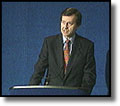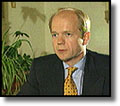Back me or sack me, says Hague
William Hague, the Shadow Welsh Secretary and one of the five contenders for the leadership of the Conservative Party, has taken the unprecedented step of giving the party the opportunity to sack him if Tory MPs elect him as John Major's successor next month. But his move has been criticised as a "gimmick" by Iain Duncan-Smith, MP for Chingford and supporter of John Redwood.
Speaking at a meeting in Barnsley, South Yorkshire, Mr Hague announced that he would rapidly convene a conference representative of the whole party if voted in as leader. At that conference, a wider range of Tory activists and party members would be allowed to either ratify the vote or sack him. "A ballot would be held at which I would seek a mandate as leader of the party and I would not continue as your leader without it," Mr Hague said.
Mr Duncan-Smith said "What he is suggesting, with
asking for his endorsement from the party, is a gimmick and an insult to party
workers...There is no point in having a competition to decide the leader by one
system, then simply demanding that the party members endorse you. There must be
choice of candidate."
Mr Hague's offer is linked to the current debate raging within the Tory Party over demands that the membership should have a say in electing the new leader. His remarks were greeted with enthusiastic applause at the Barnsley meeting, as he promised a new beginning which would "mean once again being proud to say that you are a Conservative." One activist said later: "We're full of common sense in Yorskhire, and I'm sure we can win the next election if William is the party leader."
The Great Reform Debate
Mr Hague warned against postponing the leadership election while the election procedure is reformed.
"It is too late. The genies are out of the bottle. You cannot put the six
genies back into the bottle," he said.
Stephen Dorrell, another leadership front runner, dismissed Mr Hague's offer
to call a special conference of the party if he won.
Speaking on BBC Radio 4's Today programme, he said "That is an interesting idea but I don't frankly think that it answers the
case because what people want I think is to be engaged in the choice before it
is made rather than simply approving the choice after it is made".

|
|
Dorrell supports a new party constitution
|
| |
Mr Dorrell has already sent a letter to constituency chairmen proposing to conduct a "listening exercise" on the question of a new party constitution. Proposals would then be put to the Conservative Central Council meeting in March 1998.
Mr Dorrell said: "An election for the leadership of the party cannot be conducted behind closed doors among 164 MPs. The process must be seen to be open and must be seen to respond to the concerns of our supporters."
But he warned against rushing to re write the party's leadership contest rules.
He said it any reform must be properly considered.
"We need party reform, but it cannot be done overnight in a hurry," he
said.
However, Robin Hodgson, the chairman of the National Union of Conservative and
Unionist Associations which represents ordinary members has called for a change in the rules ahead of the current election. He said the union had approached the backbench 1922 Committee, which is conducting the contest, about the prospect of setting up an electoral college of constituency chairmen who would select the new leader.
Leadership Battle
Mr Dorrell portrayed himself and Mr Hague as the only candidates who could enable the party to make a "decisive break with recent history". In doing so, he challenged Mr Hague to a head-to-head debate. Mr Hague has turned down the offer.
A poll in The Times newspaper shows that the former Chancellor , Kenneth Clarke, is the overwhelming favourite to take the leadership. Twenty-five per cent of respondents supported Mr Clarke's bid, giving him a fourteen point lead over John Redwood.
|


